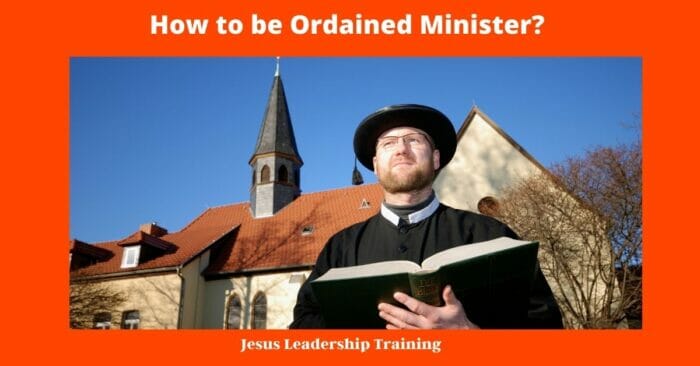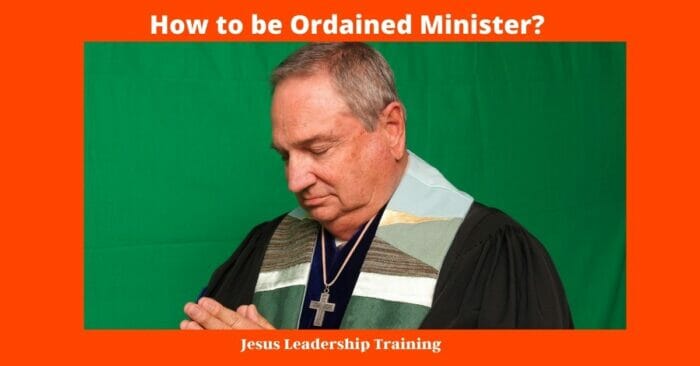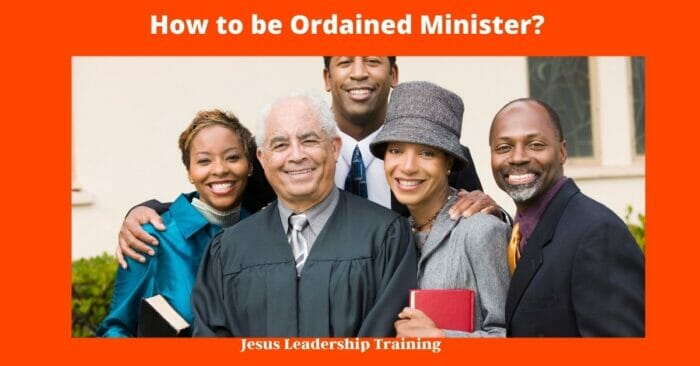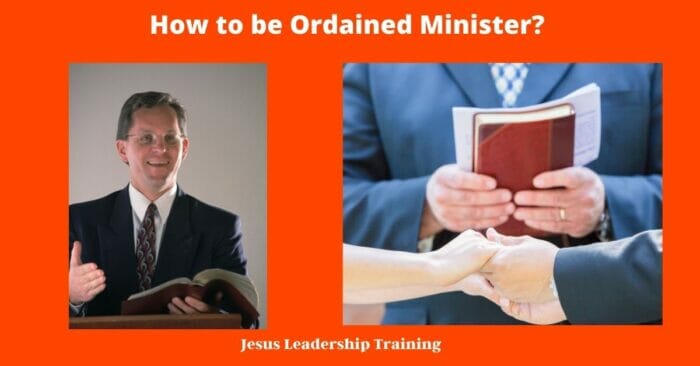Here are general requirements for ministers in the 1) Catholic Church, The Anglican Church, The Methodist Church, The Baptist Church, Church of Christ, Community Churches……
Table of Contents
How to be Ordained Minister?
Are you curious about how to be an ordained minister? If you are looking for a more meaningful way to serve your community, becoming an ordained minister may be the right choice for you. In this blog post, we will discuss the process of ordination and what it takes to become a minister. We will also provide a few tips on how to get started!
What are the Main Christian Faiths that have an Ordained Minister Pathway?
The main Christian Faiths that have an Ordained Minister Pathway are the Catholic Church, the Anglican Church, and the Lutheran Church. These three denominations have a clearly-defined process for ordaining ministers, which includes education and training requirements, as well as examinations that must be passed. How to be Ordained Minister?
Other Christian denominations may also have an ordained minister pathway, but it can vary from faith to faith. For example, the Methodist Church does not have a specific path for ordination, but individuals who wish to become ministers must be approved by their local church board and meet other criteria.

So what are the benefits of becoming an Ordained Minister?
Some of the benefits of becoming an ordained minister include:
- Weddings – You can perform religious ceremonies as a married couple or perform funerals/weddings for friends and family members. It’s also very affordable to become an ordained minister online, with some services being entirely free while others only costing $20-$30.
- Funerals
- Tax Benefits – The IRS allows you to claim deductions on your taxes for certain expenses related to ministry work. In addition, if you are ordained as a minister by an established church or religious order that recognizes its members as ministers of the gospel, then these tax benefits may apply even when working outside those churches!
- Clergy Privileges – Those who have been ordained can perform many duties within their community such as officiating weddings and funerals, conducting baptismal services or performing other sacraments according to one’s faith tradition.
- Baptism Ceremonies – Some ordained ministers have the ability to perform baptisms. This may be done with water or oil depending on what your beliefs are
- Ministerial Ordination – An online minister must receive their ministerial ordination from an accredited school that is recognized by the state where they live in order to legally perform marriages and funerals.
- Church Planting – If you have a passion for growing churches, then becoming an ordained minister is a great way to do this. You can plant your own church and start spreading God’s word among people who may not be able to come into contact with Him through traditional means like going to church every Sunday morning or Friday night youth group meetings because they live too far away
- Spiritual Guidance – Many people seek out ordained ministers for spiritual guidance or counseling. If you feel called to offer this type of support to others, then becoming an ordained minister may be a great way to do so!
- Confirmation – The act of ordination is an important step in the life of a Christian. It certifies that you are now able to carry out your church’s ministry with confidence and competence! It also means being recognized as someone who can speak on behalf of God when called upon by society at large (for example, during times when there may be controversy over certain issues within Christianity).
- Communion – Communion is a sacred rite performed by an ordained minister. In some denominations, this includes consecrating bread and wine before distributing them among those present for Mass or other worship services where such acts take place regularly throughout each day’s liturgy schedule. As part of their duties, ministers also bless sacramental objects like communion cups used during Mass.
- Marriage – When two people decide to get married, one of the most important steps they take is finding a minister who can officiate their wedding ceremony. By becoming an ordained minister, you can provide this valuable service for couples in your community!
- Ordination Certificate – After completing the ordination process, you will be sent an ordination certificate that verifies your status as an ordained minister. This document can be used to prove your credentials when applying for jobs in ministry or other related fields. It also looks great framed and hung on the wall!

What Requirements from the Bible to be an Ordained Minister?
In the bible, there are very few requirements for becoming a minister. The main requirement is that the person is called by God.
What Requirements from the Bible to be an Ordained Minister? In order to become an ordained minister according to biblical standards, there are a few requirements one must meet.
The first and foremost is that the individual must receive a calling from within themselves as it says in Romans 12:11 “Do not conform to the pattern of this world, but be transformed by the renewing of your mind.” In other words, we must answer a calling from within ourselves before anything else can happen.
The second requirement is that you must have faith in Jesus Christ as your personal Lord and Savior. It does not matter if you are Catholic or Protestant because God loves all people equally despite their religious beliefs or affiliations with various organizations on earth.
The third requirement for becoming an ordained minister according to biblical standards would include being baptized into one’s newfound faith which means immersion under water during baptism services performed either inside church buildings where there is usually a shallow pool meant specifically for baptisms (usually located near altar area) or outdoors where there would be flowing water such as rivers, lakes, and oceans, etc., but not limited to these locations only.
The fourth requirement for becoming an ordained minister according to biblical standards would include the individual taking part in ministry work of some sort whether it’s teaching Sunday school classes or volunteering at local soup kitchens which feed homeless people their meals every week without fail each time they go hungry because no one has fed them yet today
The message being spread by Jesus Christ throughout his life while on earth was always about love so if anyone wants to minister then they need to think long and hard before doing so as it will take its toll physically mentally emotionally spiritually financially (assuming you have a job) & most importantly psychologically speaking too!
What are the Requirements to become ministers in the following:
Catholic Church
In Catholic churches the structure of church Leadership is:
Pope (Head of Catholic Church)
- The process for becoming Pope is much more complicated and lengthy than that of becoming a cardinal or bishop. In order for someone to become the pope, they must be a baptized male and have been a Catholic priest for at least 15 years. They must also be over the age of 80. After being elected by the College of Cardinals, the new Pope is then consecrated by two other cardinals (usually the Dean of the College of Cardinals and the Cardinal Camerlengo).
- The pope is elected for life by the Cardinals, but he can resign from his position at any time.
- The seminarian stage requires four years of study in theology at a seminary. After graduation from the seminary, the priest serves for roughly one year as a transitional deacon. It typically takes five years from college graduation to ordainment, provided the priest has studied philosophy at the undergraduate level.
Cardinals
- In order to become a Cardinal, men must first be ordained as bishops or priests and then join the College of Cardinals. There are two types of cardinals: cardinal deacons and cardinal priests. Cardinal deacons normally serve as the head of a department in the Roman Curia, while cardinal priests are usually assigned to one of the Vatican’s churches. To be eligible to become a cardinal, men must be under 80 years of age.
Bishops
- In order to become a bishop, individuals must first be ordained as priests and then undergo an election process. The election is carried out by the people who are in charge of appointing leaders within their particular church, such as a Metropolitan Archbishop or a religious order’s Superior General.
Priests
- In order to become priests, individuals must first be ordained deacons and then undergo an ordination process. First they must complete their education and then receive the sacrament of Holy Orders. This ordination will then allow them to celebrate Mass, hear confessions, and administer other sacraments. The process for becoming a priest is different in each Catholic diocese, but it usually takes between four and six years to complete.
- In order for someone to become a priest they must be ordained. To be ordained one must have:
- Be male
- Be baptized in water
- Have received first Holy Communion
- Have been confirmed
- Be between 25 and 65 years old (special exceptions can be made in the case of a mature married man, but even then it must only be ordained if he has lost his wife or is widowed)
- Be in good physical health. –
- Possess a high school diploma (or equivalent GED)
- Complete at least four years of college (or the equivalent)
- Be free from any canonical penalties
- Complete a year of pastoral experience in a parish setting.
- After all of these requirements have been met, the bishop then interviews the man and if everything is satisfactory, ordination takes place. After ordination, priests are assigned to a parish by the bishop.
- Guide

Anglican Church
- In the Anglican church, there are three orders of ministry –
- Priest – The primary role of an Anglican priest is to lead their church and its members in worshiping God. They may also perform other functions, such as: teaching children about Christianity or helping the poor and needy by providing food or shelter.
- Deacon – Deacons are ordained ministers who serve under bishops, priests and others. They assist with various aspects of church life, such as preaching, teaching, leading worship and ministering to the sick and needy.
- Bishop – Bishops are ordained ministers who oversee a diocese (an area containing several churches). They are responsible for appointing priests and deacons, setting doctrine and discipline within their diocese, and providing pastoral care to the people in their area.
- Laity – The laity in Anglicanism consists of all members who are not ordained. They have a variety of roles, including:
- Preaching (if they have the gift)
- Teaching children about Christianity or helping the poor and needy by providing food or shelter.Stipendiary Lay Ministers – These ministers are paid for their work
- AnglicanGuide
Lutheran
In Lutheran Churches their Leadership consist of:
Bishop – Oversees a geographic area called a diocese. The training they need is usually a Master of Divinity degree from an accredited seminary.
Pastor – Preaches, teaches, and leads a congregation. They need to have completed at least four years of college or university, plus three years of theological education.
Deacon – Helps with pastoral work and administers the sacraments in some congregations. Requirements vary from denomination to denomination, but usually a deacon has a degree from an accredited theological school.
Presbyter – A pastor who has been ordained and leads a congregation. Requirements vary from denomination to denomination, but usually presbyters have a degree from an accredited theological school.
Methodist
In Methodist churches, Leadership consists of:
Superintendent – The senior minister in a Methodist church. He or she is appointed by the bishop to oversee the work of the ministry in a given charge (a geographical area).
Pastor – A pastor is called by God and affirmed by the congregation to preach, teach, and lead pastoral care in a local church.
Deacon – Deacons are ordained ministers who assist pastors in carrying out their ministries and serve as leaders of outreach ministries in the church.
Local Ministerial Association – Leaders from each of these groups meet together regularly to support one another, pray for one another, and discern how they might best serve Christ’s mission locally.
There are no specific requirements needed to become a minister within Methodism. Ministry is open to all who feel called by God and affirmed by the congregation.
Baptist
In Baptist churches, Leadership consists of:
Bishop – The senior minister in a Baptist church. He or she is appointed by the bishop to oversee the work of the ministry in a given charge (a geographical area).
Pastor – A pastor is called by God and affirmed by the congregation to preach, teach, and lead pastoral care in a local church.
Deacon – Deacons are ordained ministers who assist pastors in carrying out their ministries and serve as leaders of outreach ministries in the church.
Local Ministerial Association – Leaders from each of these groups meet together regularly to support one another, pray for one another, and discern how they might best serve Christ’s mission locally.
Congregationalist/UCC: In Congregationalist churches, Leadership
- Bishop – The senior minister in a Congregationalist church. He or she is appointed by the bishop to oversee the work of the ministry in a given charge (a geographical area).
- Pastor – A pastor is called by God and affirmed by the congregation to preach, teach, and lead pastoral care in a local church.
- Deacon – Deacons are ordained ministers who assist pastors in carrying out their ministries and serve as leaders of outreach ministries in the church.
- Local Ministerial Association – Leaders from each of these groups meet together regularly to support one another, pray for one another, and discern how they might best serve Christ’s mission locally.
- Congregationalist Guide
Churches of Christ
Church Of Christ In Churches Of Christ, leadership consist of:
Elder – An elder is a minister who leads a single congregation.
Minister – A minister is an ordained leader of the church. Ministers are called by God and affirmed by the congregation to preach, teach and lead pastoral care in local churches.
Deacon – Deacons are ordained ministers who assist pastors in carrying out their ministries and serve as leaders of outreach ministries in the church.
Church of Christ Preacher School
Community Churches
Various Structures depending on Location Most Common
Evangelist – An evangelist is a minister who preaches the gospel.
There are no specific requirements needed to become a minister within Community Churches. Ministry is open to all who feel called by God and affirmed by the congregation.
Pentecostal
In Pentecostal churches, Leadership consists of:
Apostle – An apostle is an elder or leader in a Pentecostal church. Apostles are appointed by God and affirmed by the church to oversee spiritual affairs in the local church and carry out missionary work in other areas.
Pastor – A pastor is called by God and affirmed by the congregation to preach, teach, and lead pastoral care in a local church.
Deacon – Deacons are ordained ministers who assist pastors in carrying out their ministries and serve as leaders of outreach ministries in the church.
Local Ministerial Association – Leaders from each of these groups meet together regularly to support one another, pray for one another, and discern how they might best serve Christ’s mission locally.
Missionary – A missionary is a minister who is sent by the church to preach the gospel and establish churches in other areas.
There are no specific requirements needed to become a minister within Pentecostalism. Ministry is open to all who feel called by God and affirmed by the congregation.
Assemblies of God: In Assemblies of God (AOG), Leadership consists of:
Apostle – An apostle is an elder or leader in a Pentecostal church. Apostles are appointed by God and affirmed by the church to oversee spiritual affairs in the local church and carry out missionary work in other areas.
Pastor – A pastor is called by God and affirmed by the congregation to preach, teach, and lead pastoral care in a local church.
Deacon – Deacons are ordained ministers who assist pastors in carrying out their ministries and serve as leaders of outreach ministries in the church.
Local Ministerial Association – Leaders from each of these groups meet together regularly to support one another, pray for one another, and discern how they might best serve Christ’s mission locally.
Missionary – A missionary is a minister who is sent by the church to preach the gospel and establish churches in other areas.
There are no specific requirements needed to become a minister within Assemblies Of God. Ministry is open to all who feel called by God and affirmed by the congregation.
Final Thoughts – How to be Ordained Minister?
Depending on Each Faith they all have requirements to be Ministers in that Faith. They are all focused on the bible but each has its own specific paths. many of the Leadership positions are the same with the same expectations.


